MercoPress. South Atlantic News Agency
Tag: whales
-
Friday, September 25th 2020 - 08:36 UTC
Grim experience for Australian authorities, euthanizing and disposing of some 400 whale carcasses

Australian officials were focusing on the grim task of disposing of almost 400 whale carcasses on Thursday, while attempts to rescue the few remaining survivors of one of the world’s worst mass strandings were expected to extend another day.
-
Tuesday, February 25th 2020 - 07:30 UTC
South Georgia is evidence of whales recovery, a century after they were heavily exploited
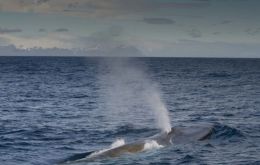
A team led by the British Antarctic Survey has just returned from the sub-Antarctic island of South Georgia, as the last of three expeditions to investigate the recovery of whales a century after they were heavily exploited. After 30 years of protection, large numbers of whales appear to be returning to the region.
-
Monday, January 6th 2020 - 08:41 UTC
New Zealanders rush to try and save a pod of stranded whales
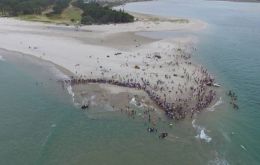
About 1,000 people rushed to a New Zealand beach over the weekend to try to save a pod of whales that stranded overnight, overwhelming conservation workers who were appealing for specialist assistance.
-
Monday, November 11th 2019 - 10:24 UTC
All whales released, secretly, from Russia's Far East “whale jail”, Moscow reports

The last whales held in a notorious facility dubbed the “whale jail” in Russia's Far East were released on Sunday, the institute overseeing the operation said.
-
Friday, October 18th 2019 - 09:44 UTC
BAS technique to detect stranded whales from space
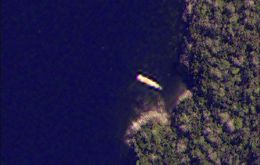
A new technique for analyzing satellite images may help scientists detect and count stranded whales from space. Researchers tested a new detection method using Very High Resolution (VHR) satellite images from Maxar Technologies of the biggest mass stranding of baleen whales yet recorded. It is hoped that in the future the technique will lead to real-time information as stranding events happen.
-
Monday, August 5th 2019 - 09:00 UTC
Arctic buoy with yearlong Beluga recordings salvaged by Swedish icebreaker
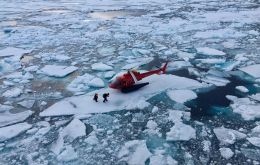
A year-long recording of the high-pitched clicks made by Beluga whales has been salvaged from the Arctic after the crew of a Swedish icebreaker chanced upon a research buoy adrift in hazardous pack ice.
-
Friday, June 28th 2019 - 19:46 UTC
Environmentalists urge G20 to press Japan to end its whaling program
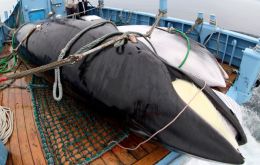
Environmentalists from around the world urged global leaders at the G20 summit on Friday not to “turn a blind eye” to what they called a “cruel assault on whales” planned by host Japan when it restarts commercial whaling next week.
-
Wednesday, June 12th 2019 - 06:36 UTC
Canada bans capture and breeding of cetaceans such as whales and dolphins

Canada's parliament on Monday approved a bill banning the capture and breeding of cetaceans such as whales and dolphins in a move hailed by animal rights activists. The bill, first proposed in 2015 and now awaiting symbolic royal approval, will not apply retroactively, meaning captive marine mammals can stay confined.
-
Saturday, May 4th 2019 - 09:52 UTC
Antarctic Tour Operators introduce mandatory measures to prevent whale strikes

Members of the International Association of Antarctica Tour Operators (IAATO) have unanimously voted in mandatory measures to prevent whale strikes in cetacean-rich Antarctic waters during their annual meeting this year held in Cape Town, South Africa.
-
Monday, April 15th 2019 - 09:21 UTC
The endangered North Atlantic right whales seem to be recovering and calving
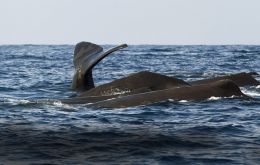
One of the world's most endangered whale species is experiencing a mini baby boom off the US state of Massachusetts. Researchers at the Center for Coastal Studies have announced they have seen three North Atlantic right whale mother and calf pairs in Cape Cod Bay.
